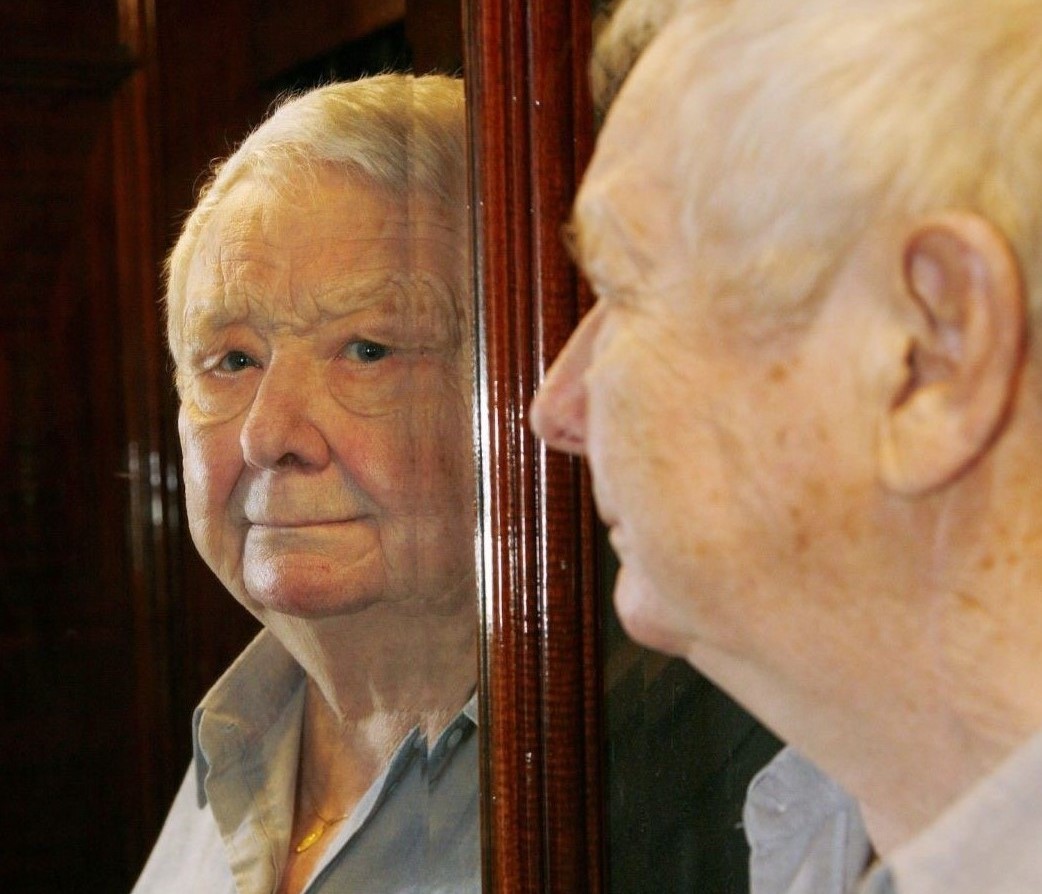from My Elevator Days
by Bengt Ahlfors
translated by Henning Koch
In the wake of the untimely death of his dog Kafka, the elderly protagonist in Bengt Ahlfors’s gentle, bittersweet monologue finds himself turning to his building’s lift, ‘Enok’, for companionship. In this expansive, delightfully digressive piece, Ahlfors weaves the story of an entire life – one lived in the same apartment building – into a lonely man’s unconventional search for connection. Confronting themes of loneliness, ageing and memory, My Elevator Days balances darkness with heartfelt humour to create a thought-provoking piece of drama.
Upon its premiere in 2007, this delicately crafted monologue became a regular feature on Helsinki’s theatre scene, and it has been widely performed throughout Europe. In December 2024, a freestanding sequel will be coming to the Helsinki stage, entitled Nyckeltanten (‘The Latchkey Woman’).
This translated excerpt is taken from the one-man-show that was performed in its entirety at Edinburgh Fringe Festival in 2012.

from My Elevator Days
But Enok. I mean he’s a lovely elevator, he’s got style. And over the years we’ve become friends. We’re the only ones left from the time the house was a youngster, we’ve joined at the hip. When I go down with him in the mornings I often say: ‘What do you reckon, Enok, anything fun to look forward to today?’ Well usually there isn’t, but it’s nice to talk to Enok about it. And in the evening when I come home, I usually tell him about my day, what’s been happening. It’s amazing just how much you can get through on your way up to the sixth floor.
I worked at the Post Office for a few years before I trained as a bookbinder, and when you’re a postman you meet a lot of elevators; old, modern, fast, slow; I used to tell Enok about them all, and I always made a point of telling him he must have belonged to the aristocracy of elevators. He had... class.
But as time passed he started getting awkward. When you pressed the button he hesitated at first for a few seconds, then started up with a tired sigh, but he didn’t have the strength to go further than the fourth floor, where he stopped and refused to go any further. So I had to walk the last two floors, just like when I was a boy, but this time not because of me but because of Enok. I mean he was old, long past retirement age.
So it was decided that Enok would have new machinery. You can do that with elevators, like with people, you just change a few parts. It was a costly affair and the property company decided that those of us living on the top floors had to pay a bigger share. Those on the ground floor or the first floor didn’t have to pay anything at all. In fact I’ve noticed Mrs. Saarela on the first floor always takes the elevator up even though she hasn’t paid a single cent. I usually give her a meaningful look, but she pretends not to get it.
Thank God Enok was allowed to keep his fixtures, only the machinery was new. And at the same time these little displays appeared by the button on the stairs, and there you can see what floor Enok is on right now, in green digits. And this really changed my life.
Because at this time I went for a check-up at St. Maria’s Hospital. My annual routine check-up. I happened to mention to the doctor that our elevator had been fitted with new machinery so I didn’t have to take the stairs now.
‘Oh dearie dearie! At your age – overweight and all! – you have to do everything in your power to maintain your physical functions. It’s the only thing that can save you from brittle bones, fractures of the femur and total physical and spiritual decline. Not to speak of the heart! That elevator is your worst enemy. Worse than pork chops, almost as bad as tobacco.’
My worst enemy! Enok? My only friend!
‘If you want to enjoy a good quality of life you have to walk. As soon as you see some stairs, walk! As soon as you see an elevator, pass by! You have to become an elevator objector!’
What a word! Like being a conscientious objector.
She preached at such length and in such detail about all the devilry threatening me that I had no choice but to do what she said. I started walking up, and it gave me such palpitations that it was obviously extremely healthy. I felt very virtuous about it, and that was nice I have to say.
So, I walked it. With a slightly superior glance at Enok: No thanks, I don’t need your services any more.
He stared at me slightly dubiously, but I just gave him a cheerful wave. Bye!
I kept it up. Every day, down the stairs, up the stairs, 128 steps. And felt virtuous. For about a month.
Then one Friday coming back from the shop I had an extremely heavy bag, food for the whole weekend and also a heavy box of red wine. You see red wine does me good; she said so, the doctor; modest amounts of red wine. But the bag was heavy and as I walked into the front lobby Enok was just standing there at the bottom, waiting for me: ‘Step inside, will you!’
‘Oh no, I’m happy to say I’m an objector when it comes to elevators!’
‘Pah! You, who’s paid more than anyone else for my new machinery, shouldn’t you have a chance to enjoy it? Is that really something to celebrate?’
‘I feel better if I walk –’
‘No you don’t! You get out of breath.’
‘But it’s healthier –’
‘With that heavy bag? You’re having me on!’
‘But; but…’
‘Go on, make an exception!’
So I let myself be persuaded. I went up. I even sat on the seat and lifted my feet so I could go up in the dark. And it felt nice, like a little sin. Once doesn’t count.
But – that was the first time I sinned, and after that the fall came easier. I fell more and more; went up, I mean. I always walked down, every time! But when it came to going up… And that’s when I realised I had to have rules, otherwise I’d go totally decrepit. I was already feeling a brittleness in the bones and a sort of fracturing around the thigh bone.
So I drew up certain rules: If Enok’s standing there waiting when I come in, I can go up with him. That’s only reasonable, isn’t it? It would be plain rude not to. On the other hand if he’s up on the fourth, fifth or sixth, which you can see on the little display, I walk all the way up… every time.
Unless I happen to have something heavy to carry, in which case I have to weigh it up and make a decision. If the bag is very heavy I’m allowed to take Enok even if he’s up at number six when I come in. But – and now things get complex – how heavy is ‘very heavy’? It would be best if you had an exact weight to stick to, but you can’t walk around with a set of scales in your bag, can you? Then it would get even heavier. And how would you weigh the scales?
Principles aren’t easy. If the bag is moderately heavy and Enok is on the third floor, what do you do then? It’s impossible having clear-cut principles in life, you always have to make a decision.
And how free is my decision? Is it really me choosing, or are the circumstances making the choice on my behalf? Isaac Bashevis Singer, a Jewish writer, says we have to believe in free will – we don’t have any choice about it. It’s a nifty thing to say, and he did get the Nobel Prize for literature, but that doesn’t help me very much standing there in front of Enok.
The problem lies somewhere between the third and fourth floor. The first floor I treat almost like the ground floor, when you’re going all the way up to the sixth, right? I often take Enok if he’s on the first, I have to admit. Sometimes also if he’s on the second. On the other hand I sometimes give him a miss although he’s sitting on the ground floor, and then I get a sort of bonus, then I can take him next time, even if he’s right at the top; it all evens out in the end, doesn’t it?
But the third floor… Sometimes I’m feeling so sporty that I just proudly march past: ‘Oh right, you’re on number three are you, Enok; well I’ll walk then!’
I do understand it’s daft talking to an elevator, I do understand that. In one of Anton Chekhov’s plays there’s someone making a speech to a cupboard, but that’s a theatrical piece, where I suppose you’re allowed to be a bit daft.
On the other hand, why shouldn’t I talk to Enok, it doesn’t do anyone any harm. I don’t have any people to talk to. People in our house don’t talk to each other, it’s not the usual way round here. I hardly know them either, hardly anyone by name, people move and new ones move in. They hurry past on the stairs; a few of them mumble a greeting, most don’t even bother; I know nothing about their lives, even though they live just a few metres away. And they know nothing about me and my life, nor do they care.
Then one day a man disappears and maybe after a few weeks have gone by someone asks: That old man on the sixth floor? No one’s seen him for a while, I wonder if… And then they shrug and hurry on. While perhaps I’m lying there inside and –

Hissvägraren
Premiere: August 2006, Helsinki City Theatre
Rights: Bengt Ahlfors Comedia KB
We are grateful to Bengt Ahlfors and Henning Koch for permission to publish this translated excerpt.
The play has been performed in Swedish, Norwegian, Finnish, Russian, Serbian, Latvian, German, Estonian and English, including at the Edinburgh Fringe Festival.
Bengt Ahlfors is one of Finland’s leading playwrights, as well as a respected director. His works have been performed in some thirty countries, in a career that has spanned over sixty years.
